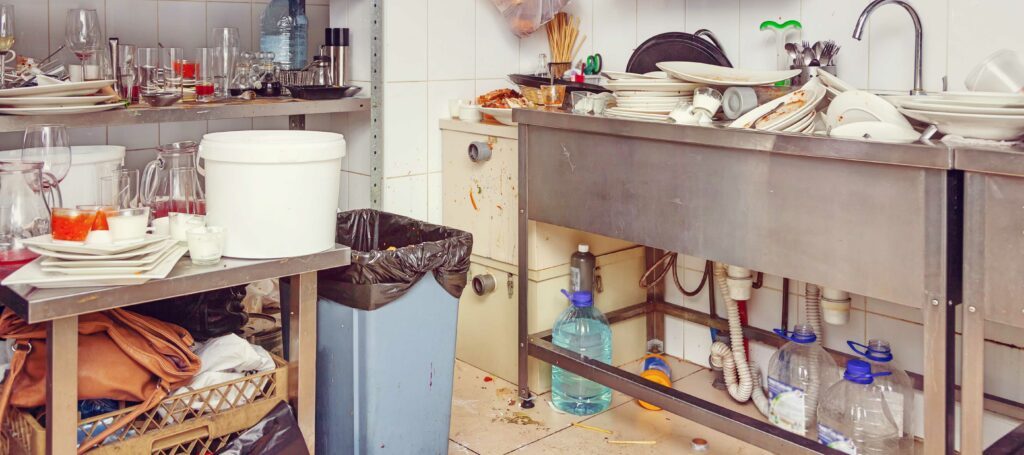Eliminate Mold and Pests With Our Wet Waste Interceptor
Mold needs moisture to grow and unwelcome pests look for both food and water. Unfortunately the dishroom in your commercial kitchen is the perfect breeding ground for both.
The only guests you want in your commercial kitchen are the paying kind. Unlike the movie Ratatouille, any pests in your dishroom are bad for business.
An unwelcome invasion of mold and pests can pose serious health risks and damage your reputation. But with careful planning and strategic measures, you can maintain a pest-free commercial kitchen and safeguard your staff, customers, and business.
Mold poses a threat both to your kitchen’s reputation and to the health of your employees and customers.
Performing routine sanitization is key. Have your employees wipe down surfaces each night. This prevents mold from continuing to grow or attracting pests. Make sure to discard any rags used to clean the mold to prevent cross contamination.
Another great way to fight mold is watching your commercial kitchen’s humidity levels. Ensure good ventilation to remove excess moisture.
Maintain humidity levels below 60% to discourage mold growth. Consider using dehumidifiers in areas where moisture tends to accumulate, such as basements or storage areas.
This also includes maintaining your kitchen’s plumbing to prevent any standing water which can attract both mold and pests.
Any leaks should be addressed promptly. Regularly inspect your pipes, faucets, and drains. Consider mold-proof materials when renovating or constructing your kitchen.
Improperly maintained refrigeration units are often places mold likes to grow. This is often due to a leaky gasket allowing warm air access. Clean and inspect these units regularly, paying close attention to door seals.
Additional problems faced by commercial kitchens are insects. Pests like flies and gnats make their homes in any old leftovers or expired food or inside your plumbing pipes with excess food debris.
Maintaining a clean environment is the most critical aspect of mold and pest prevention. Rigorous sanitation standards are your first line of defense.
Ensure that all food is stored securely in pest-proof containers and refrigerators. It’s crucial to clean up food debris and spills immediately, especially in hard-to-reach areas behind appliances and under shelving units.
All dishes should be cleaned promptly after use, and trash should be regularly removed from the kitchen and disposed of in sealed containers outside the premises.
It’s also crucial to create a culture of cleanliness among your kitchen staff. This isn’t simply about one-off deep cleans, but rather about the day-to-day habits that can make a real difference.
As part of the team’s training, emphasize the importance of mold and pest prevention and the role that each individual plays in this effort.
Proper building maintenance is another key to preventing mold and pests. This involves regularly inspecting and repairing possible entry points such as cracks, crevices, and holes in walls, doors, and windows.
Pay particular attention to areas around pipes, vents, and utility lines, as these are often overlooked spots where pests can enter. It’s also beneficial to install door sweeps and weather stripping to seal gaps beneath doors, preventing pests from creeping in unnoticed.
Keep the exterior of the building and surrounding areas clean and well-maintained. Trim vegetation away from the building, as overhanging branches or shrubs can provide pathways for insects to enter.
Equally important is the management of outdoor spaces. Keep them free of standing water, clutter, and overgrown vegetation that can attract pests and provide them with hiding places.
Make sure that dumpsters and compost bins are located away from the building’s entrances and are equipped with tightly fitting lids. By creating an inhospitable environment for pests outside your kitchen, you reduce the chances of them making their way inside.
If your restaurant has a decorative fountain or other water source, make sure to treat it with proper chemicals. Install insect-proof screens on windows, doors, and ventilation openings to prevent insects from entering the kitchen while allowing airflow.
Like mold, insects are drawn to damp to damp areas. This means it is crucial to maintain clean and functioning drains. Regularly clean and inspect drains to remove any food scraps that attract insects. Additionally, fix any plumbing leaks or issues promptly to prevent water accumulation.
However, there is a product that prevents food scraps from winding up down the drain entirely and it will help eliminate problems with drain flies.
If you want to capture a lot of the food waste that is going down the drain from a commercial garbage disposal, consider installing The Drain Strainer™ wet waste interceptor.
The Drain Strainer™ can help you avoid issues with what gets put down your drains. No matter how much you focus on employee training, short cuts are always going to be taken and items are going to be put down your kitchen’s 3 compartment sink that can harm it.
If you want to avoid issues with garbage grinders that are leaking or have burned out motors, The Drain Strainer™ is an effective and affordable commercial disposal alternative.
Invented by a former restaurant owner, The Drain Strainer™ can eliminate issues with mangled silverware or dangers from employees putting their hands down the commercial garbage disposal trying to clear out a clog.
Click here to find out more about how our wet waste interceptor can keep the 3 compartment sinks in your commercial kitchen running smoothly.
Preventing mold and pests in your commercial kitchen requires a comprehensive and proactive approach that includes meticulous sanitation, regular maintenance, responsible outdoor management, and swift action when necessary.
By adhering to these principles, you will not only create a safer, healthier environment for your staff and patrons but also protect the reputation and profitability of your business. The effort you put in today will safeguard your commercial kitchen from the potential perils of pests tomorrow.

